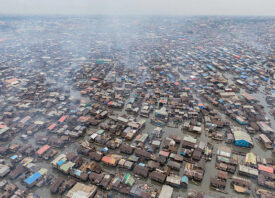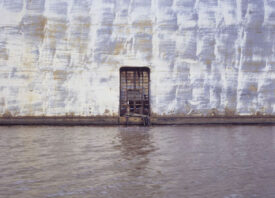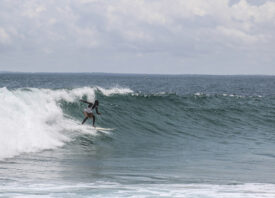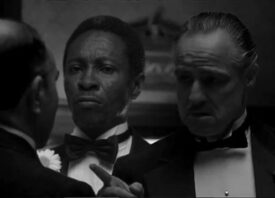Search this site
Fascinating Photos Explore the Untouched Life of a 200-Year-Old Fishing Village in Nigeria
The morning traffic on one of Makoko’s main canals. In addition to providing a means of transportation, the canals also serve as marketplace. In the early morning the women start bartering different kinds of goods.
A beauty salon.
Makoko is a 200-year-old fishing village built on the bank of the Lagos Lagoon in Nigeria. Lagos has recently become one of Nigeria’s economic centers and Africa’s largest city, housing more than 20 million inhabitants. Romanian photographer Petrut Calinescu documented life in this community of fishermen, which has remained untouched by the economic boom around it.
There are about 100.000 people living in Makoko. Most of them are fisherman from Benin and Togo. The village is located very close to Ykoki, the business center of Lagos. Still, the Nigerian government does not recognize the legitimacy of Makoko and does not provide any public services. The community has no running water, electricity, sewage system, public schools or hospitals.
Forced by its circumstances, Makoko has created an original system in order to survive and manage itself. Although the community is settled atop water, drinking water is in great shortage, and it is extracted via drilling and sold for household needs. A cobweb of sewers is full of refuse and human waste. The community suffers also from a high shortage of fish. Nowadays, merchants’ food stalls and boats are full of frozen mackerel imported from Holland, which the people then bloat in order for it to resist the heat.
The lack of an organized sewer system and drinking water puts the population’s health at risk, a concern that pales when compared to the fear of being evicted overnight by the government. Makoko is located in an area of Lagos that presents great interest for real estate business, and it could soon be filled with sand, turned into land and sold to the wealthy. There are various initiatives to regenerate the area, and influential businessmen want it to become a second Dubai through a grandiose project named Eko-Atlantic. And at this point, the future of Makoko remains uncertain.
The photo project has been made possible with the support of Fond Romania through the World -Wise Europe: A More Coherent Europe for a Fairer World program.

In African families, children have their own duties. Most often they are in charge of bringing water, but in Makoko they are sent to deliver things or to earn money by transporting people around by boat.

In Makoko, many activities take place in plain sight because there is not enough space inside the houses.

Life inside one of the houses.

The private health center, known to be the best in Makoko. Many of the locals opt for the services of traditional doctors and witchdoctors.

The small houses often shelter several generations.

A woman is breastfeeding her child while waiting for her husband to come back from fishing. The fish must be delivered to the market immediately, because no one owns a fridge in Makoko.

Local fisherman eat frozen mackerel imported from Holland, because there isn’t enough fish in the filthy water.

A mother comes home to her little girl.
All images © Petrut Calinescu





